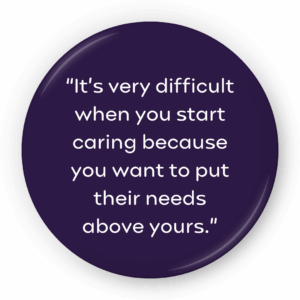As the population ages, dementia and specifically Alzheimer’s disease, is becoming an increasing concern for many of us. While the symptoms vary, the impact is profound, often leading to a gradual loss of independence and placing immense emotional, physical, and financial strain on their loved ones. Understanding Alzheimer’s disease is crucial, not only for those living with it but also for the unpaid carers who provide vital support in managing the condition on a day-to-day basis.
Caring Together Charity supports almost 2,000 local unpaid carers who care for a loved one with a form of dementia. We spoke to Jo who cares for her mother to shine a light on what it is like to care for a family member with Alzheimer’s disease.
Meet Jo
Jo’s mum is in the mid-stages of Alzheimer’s disease and lives with Jo and her husband. We asked her when she started noticing a change in her mum’s behaviour that led to her diagnosis. “The very first time we noticed a change is when she had dozed off and she woke up saying ‘Where am I?’ She also would forget to take her medication, and we would find tablets hidden or she wouldn’t know what to
do with them. She would stop eating proper food and sleep more in the day when she has always been a keen gardener and always busy in the house.”
At the start, Jo’s mum was aware that something wasn’t quite right with her memory but after speaking to a family doctor, she knew it was important to speak to her mum’s GP sooner rather than later. At the stage where her mum was referred to a Memory Clinic for tests, she spoke to her mum about how she wanted to live the rest of her life over a period of a year and her answer was always the same and consistent – with family, and not a care home. Jo opens up about how vital it was to make these decisions whilst her mum still had the mental clarity and capacity to choose for herself.
We asked Jo what a typical day involves. “I start off the day by ensuring mum is dressed, doing her skincare routine, brushing her teeth, and putting in her dentures and hearing aids,” explains Jo, “I’ll then make her breakfast and give her her medication before getting myself ready. Some days, we go for a walk, or visit friends and some days she goes to daycare. I work from home part-time therefore
my husband and sister help me when needed and are a great support.”
When asked how she has adapted to her life as an unpaid carer, Jo said, “it’s very difficult when you start caring because you want to put their needs above yours but you have to realise that if you don’t prioritise your mental health and wellbeing you will not be able to do the job of caring.”
“My husband has been amazing at giving me pep talks along the way, he helped me slowly realise I needed to make time for myself (but it didn’t come naturally to me). It has taken me three and a half years to realise my self-care is a priority, but I try to go for a walk or go to the gym to gather some time to myself.”
We know how difficult it can be as an unpaid carer so we asked Jo her advice. “It’s more tiring than you think it will ever be and you can’t do it on your own, you need other people to help and the forums and support groups out there like Caring Together can help a lot. Mum’s dementia journey has changed – what she wanted and needed. When we first started out is different to what she needs now. I would also say live in the moment and don’t put pressure on yourself to make plans for the future. If you work like I do, speak to your employer to see what flexible working options there are, this should help reduce a lot of stress that you may face during the early stages as you start to get into a new routine.”





